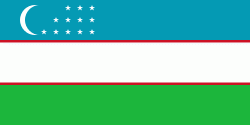Navoiy
Navoiy, also spelled Navoi, is a city and the capital of Navoiy Region in the southwestern part of Uzbekistan. Administratively, it is a district-level city, that includes the urban-type settlement Tinchlik. It is located at latitude 40° 5' 4N; longitude 65° 22' 45E, at an altitude of 382 meters. The city is named after Ali-Shir Nava'i. As of 2020, its population was 144,158 inhabitants.
Originally known as Kermine (or Karmana) under the Emirate of Bukhara, the city was re-founded in 1958, under the name of the great Uzbek poet and statesman Alisher Navoi, who wrote in Persian and Chaghatai at the court of Emir Husein Boykara (or Husayn Bayqaro) in Herat.
Even though the town is very young, it has rich history in this area and its surroundings. The Great Silk Road went through these countries in ancient times. The archeological researches in the area have also produced findings of numerous traces of Ancient Saki, Khorezm and Baktriya cultures.
Originally known as Kermine (or Karmana) under the Emirate of Bukhara, the city was re-founded in 1958, under the name of the great Uzbek poet and statesman Alisher Navoi, who wrote in Persian and Chaghatai at the court of Emir Husein Boykara (or Husayn Bayqaro) in Herat.
Even though the town is very young, it has rich history in this area and its surroundings. The Great Silk Road went through these countries in ancient times. The archeological researches in the area have also produced findings of numerous traces of Ancient Saki, Khorezm and Baktriya cultures.
Map - Navoiy
Map
Country - Uzbekistan
 |
 |
| Flag of Uzbekistan | |
The first recorded settlers in what is now Uzbekistan were Eastern Iranian nomads, known as Scythians, who founded kingdoms in Khwarazm (8th–6th centuries BC), Bactria (8th–6th centuries BC), Sogdia (8th–6th centuries BC), Fergana (3rd century BC – sixth century AD), and Margiana (3rd century BC – sixth century AD). The area was incorporated into the Iranian Achaemenid Empire and, after a period of Macedonian rule, was ruled by the Iranian Parthian Empire and later by the Sasanian Empire, until the Muslim conquest of Persia in the seventh century.
Currency / Language
| ISO | Currency | Symbol | Significant figures |
|---|---|---|---|
| UZS | Uzbekistan som | so'm or Ñўм | 2 |
| ISO | Language |
|---|---|
| RU | Russian language |
| TG | Tajik language |
| UZ | Uzbek language |















